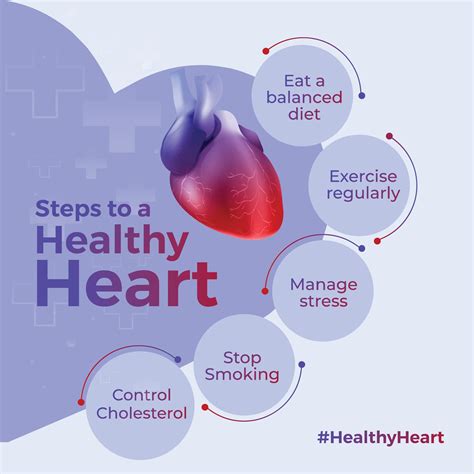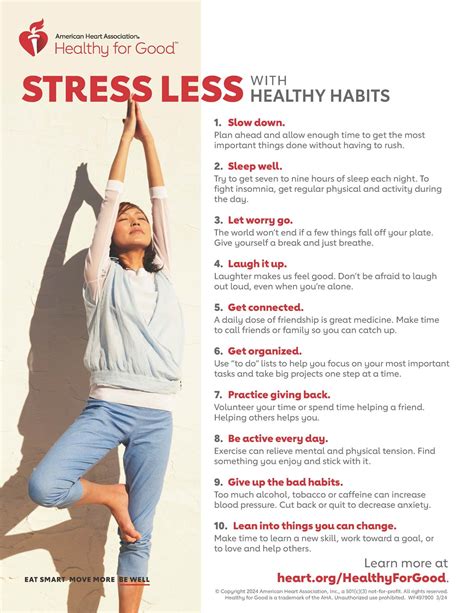Intro
Boost heart health with 5 essential ways, incorporating cardio exercises, balanced diets, and stress management to reduce cardiovascular disease risks and promote overall wellness.
Maintaining a healthy heart is crucial for overall well-being, as it pumps blood throughout the body, supplying oxygen and nutrients to tissues and organs. A healthy heart also reduces the risk of heart disease, which is one of the leading causes of death worldwide. With the increasing prevalence of heart disease, it's essential to adopt a heart-healthy lifestyle to prevent and manage the condition. In this article, we'll explore the importance of heart health, its benefits, and provide practical tips on how to maintain a healthy heart.
A healthy heart is not just about preventing heart disease; it's also about maintaining overall physical and mental well-being. Regular exercise, a balanced diet, and stress management are all crucial components of a heart-healthy lifestyle. By incorporating these habits into daily life, individuals can significantly reduce their risk of developing heart disease and improve their overall quality of life. Furthermore, a healthy heart can also boost energy levels, improve sleep quality, and enhance cognitive function.
The benefits of a healthy heart are numerous, and it's essential to understand the importance of maintaining a healthy cardiovascular system. A healthy heart can help prevent conditions such as high blood pressure, high cholesterol, and heart failure, which can significantly impact an individual's quality of life. Additionally, a healthy heart can also reduce the risk of stroke, kidney disease, and other cardiovascular conditions. By adopting a heart-healthy lifestyle, individuals can take control of their health and reduce their risk of developing these conditions.
Understanding Heart Health

Benefits of a Healthy Heart
A healthy heart provides numerous benefits, including reducing the risk of heart disease, improving overall physical and mental well-being, and boosting energy levels. Additionally, a healthy heart can also improve sleep quality, enhance cognitive function, and reduce the risk of stroke and kidney disease. By maintaining a healthy heart, individuals can take control of their health and reduce their risk of developing these conditions.Maintaining a Healthy Heart

Practical Tips for a Healthy Heart
Here are some practical tips for maintaining a healthy heart: * Eat a balanced diet that is low in saturated fats, sodium, and added sugars * Engage in regular exercise, such as walking, running, or swimming * Manage stress through techniques such as meditation, yoga, or deep breathing * Get enough sleep each night, aiming for 7-8 hours * Avoid smoking and limit alcohol consumptionExercise and Heart Health

Benefits of Exercise for Heart Health
The benefits of exercise for heart health are numerous. Regular exercise can help: * Improve cardiovascular health * Reduce blood pressure * Improve overall physical fitness * Reduce stress and anxiety * Improve sleep qualityDiet and Heart Health

Benefits of a Healthy Diet for Heart Health
A healthy diet provides numerous benefits for heart health, including: * Reducing the risk of heart disease * Lowering blood pressure * Improving overall physical and mental well-being * Reducing the risk of stroke and kidney disease * Improving sleep qualityStress Management and Heart Health

Benefits of Stress Management for Heart Health
The benefits of stress management for heart health are numerous. Stress management can help: * Reduce the risk of heart disease * Lower blood pressure * Improve overall physical and mental well-being * Reduce the risk of stroke and kidney disease * Improve sleep qualityConclusion and Final Thoughts

We invite you to share your thoughts and experiences on maintaining a healthy heart. What tips and strategies have you found most effective in reducing your risk of heart disease? Share your comments below, and let's work together to promote heart health and well-being.
What are the benefits of regular exercise for heart health?
+Regular exercise can help improve cardiovascular health, reduce blood pressure, and improve overall physical fitness. Additionally, exercise can also help reduce stress and anxiety, which can negatively impact heart health.
What foods are beneficial for heart health?
+Foods that are low in saturated fats, sodium, and added sugars are beneficial for heart health. Examples include fruits and vegetables, whole grains, lean proteins, low-fat dairy products, and healthy fats, such as avocado and nuts.
How can stress management techniques improve heart health?
+Stress management techniques, such as meditation, yoga, and deep breathing, can help reduce stress and anxiety, which can negatively impact heart health. By managing stress, individuals can reduce their risk of heart disease and improve their overall quality of life.
